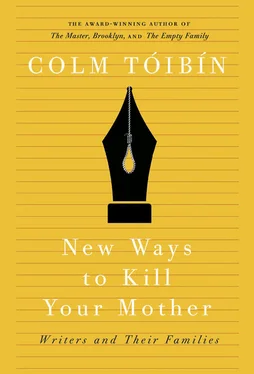One of John Cheever’s most famous stories is called ‘The Swimmer’. It is set, like much of his fiction, in the lawned suburbs somewhere outside New York City, and it is filled, like most of his fiction, with despair. The hero, Neddy Merrill, the father of four daughters, is sitting by a neighbour’s pool drinking gin when the idea comes to him that he might reach home by doing a lap of all of his neighbours’ pools on the way. In the pages that follow he is both a mythical hero of the suburbs and a holy fool; he is both a legend in his own dreams and a ridiculous figure, a character whose reality is evoked by the close detail with which his world is described, but who is also a victim of his own imaginings. There is a realism in the way the detail and the characters are evoked that forces the reader to believe that this is actually happening — that Neddy is really swimming home, pool by pool — but there is also something else going on that makes us wonder if the story is a metaphor for something, or a parable. It ends with Neddy’s arrival home to find his house dark and its doors locked. ‘He shouted, pounded on the door, tried to force it with his shoulder, and then, looking in at the windows, saw that the place was empty.’
Cheever’s journals for the months before he wrote the story included an entry that dealt with his increasing ambition and fame: ‘I dream that my face appears on a postage stamp.’ Soon afterwards, he wrote about something that might have prevented this actually happening: about a secret life that gave him creative energy and filled him with suburban shame. On the one hand, he wanted to be a happily married man and a devoted father, the man whom his friends and readers believed him to be. ‘It is my wife’s body that I most wish to gentle, it is into her that I most wish to pour myself,’ he wrote. But, on the other hand, his thoughts had a habit of turning, as they did in that same diary entry, to his sexual interest in men, this time to a male figure he had seen by a swimming pool. ‘His soft gaze follows me, settles on me, and I have a deadly itchiness in my crotch.’ He thought about having sex in the shower with the young man; he contemplated ‘the murderous checks and balances of a flirtation’. But then he realized that he was, in fact, a respectable married man with three children who dreamed of having his face on a stamp. ‘But then there are the spiritual facts: my high esteem for the world, the knowledge that it is not in me to lead a double life, my love of perseverance, a passionate wish to honour the vows I’ve made to my wife and children.’ Nonetheless, he was intrigued by the urge, which his creation Neddy Merrill would soon also feel,
to plunge into life, to race after our instincts, to upset the petty canons of decency and cleanliness, and yet if I made it in the shower I could not meet the smiles of the world… I have been in this country a hundred times before… Why should I be tempted to throw away the vast delights of love for a chance shot in a shower?
Thus ‘The Swimmer’, read in tandem with Cheever’s journals, becomes a version of the writer’s dream and then his nightmare. His dream was that he should have ‘breached this contract years ago and run off with some healthy-minded beauty’, his nightmare that he would come home to an empty house, that he would, because of instincts he barely understood and deeply despised, lose the domestic life he craved and the people he most loved. He wrote in his journals that he was locked into ‘the toleration of an intolerable marriage’. Soon after his account of the man he had seen by the pool, he wrote of being with his younger son, Federico: ‘I have no freedom from him. Never having known the love of a father has forced me into a love so engulfing and passionate that there is no margin of choice.’
He filled his journals with images of love for those around him and longing for domestic harmony, and then broke the harmony with images of despair, often caused by hangovers (he drank vast quantities, often starting in the morning), and of hate, usually for his wife (who for much of the time they were married did not speak to him, often with good reason). Few images of happiness or ease were allowed to stand. In 1963, for example, he registered a memory from childhood of being at the beach with his parents and his older brother, Fred, and then returning home.
We have our ice cream on the back lawn, read, play whist, wish on the evening star for a gold watch and chain, kiss one another goodnight, and go to bed. These seemed to be the beginnings of a world, these days all seemed like mornings, and if there was a single incident that could be used as a turning point it was, I suppose, when my father went out to play an early game of golf and found a dear friend and business associate on the edge of the third fairway hanging dead from a tree.
The tone in Cheever’s journals was usually self-pitying and humourless. In the stories, however, he could turn domestic despair into comedy and then back again, often in a single phrase. Neddy in ‘The Swimmer’, for example, Cheever wrote, ‘might have been compared to a summer’s day, particularly the last hours of one’. Or in ‘The Country Husband’, as the children are bickering in their father’s presence before their mother enters to announce that supper is ready in their nice suburban house, Cheever risks a phrase that makes you unsure whether to laugh or cry: ‘She strikes a match and lights the six candles in this vale of tears.’
For Cheever, the house, the simple suburban house, was a sort of hell. Yet this was where he lived, and the idea of losing it, or being left alone in it, was a further depth of hell that he dreaded. In his journal for 1963 he brooded over this:
My grandfather is supposed to have died, alone, unknown, a stranger to his wife and his sons, in a furnished room on Charles Street. My own father spent two or three years in his late seventies alone at the farm in Hanover. The only heat was a fireplace; his only companion a halfwit who lived up the road. I lived as a young man in cold, ugly and forsaken places yearning for a house, a wife, the voices of my sons, and having all of this I find myself, when I am engorged with petulance, thinking that after all, after the Easter egg hunts and the merry singing at Christmas, after the loving and the surprises and the summer afternoons, after the laughter and the open fires, I will end up cold, alone, dishonoured, forgotten by my children, an old man approaching death without a companion.
Cheever had another problem besides his fear that his secret sexuality would be discovered and that he would lose the cocoon of domestic life that left him so blissfully unhappy. He was a snob. He believed that he was a Cheever and that this meant something, that he belonged in some way to American grandeur. Thus his social status in the suburbs mattered to him, as did material wealth and its trappings, even when he did not have them. The decline in fortune suffered by his parents and the drunken antics of his brother, their letting the family name down, filled him with as much shame as his own sexuality or his own drinking. In company he could be suave and charming, but the minute he was alone and putting pen to paper, this shame and its attendant dramas would make its way into his fiction and his journals in guises both comic and maudlin. He was aware, as were others, of his ‘cultivated accent’ — his daughter, Susan, reported her friends asking if he was English or something — and noted that he should be careful with it. ‘When this gets into my prose, my prose is at its worst.’
The first Cheever in America was Ezekiel, who was headmaster of the Boston Latin School from 1671 to 1708, and the author of a book on Latin that was the standard textbook in the United States for more than a century. On his mother’s side, Cheever claimed to be descended from Sir Percy Devereaux, a mayor of Windsor: indeed, his mother kept a picture of Windsor Castle on her wall. But this was nonsense; he had no such ancestor. When Cheever’s family wanted to mock him, they referred to him as the Lost Earl of Devereaux. His mother was a nurse; he gave some of her characteristics, such as her interest in organizing others, to Honora Wapshot in his first novel, The Wapshot Chronicle . Like Coverly Wapshot, Cheever blamed his mother for handing on some of her worst anxieties to him. His father was a shoe salesman.
Читать дальше












